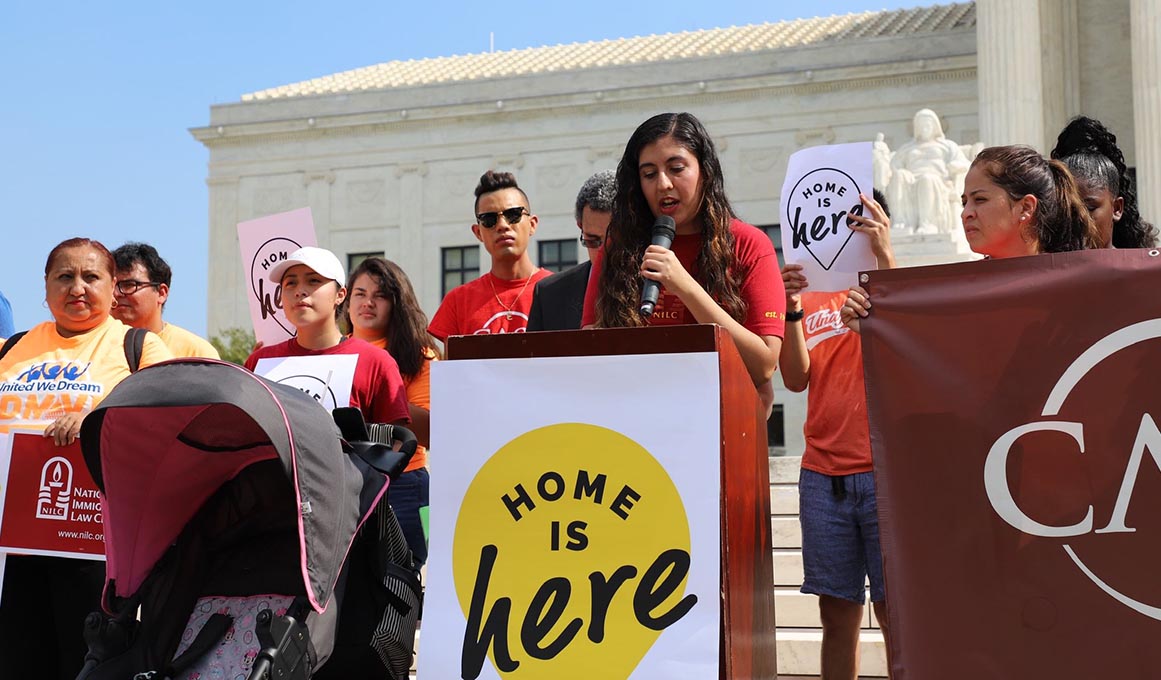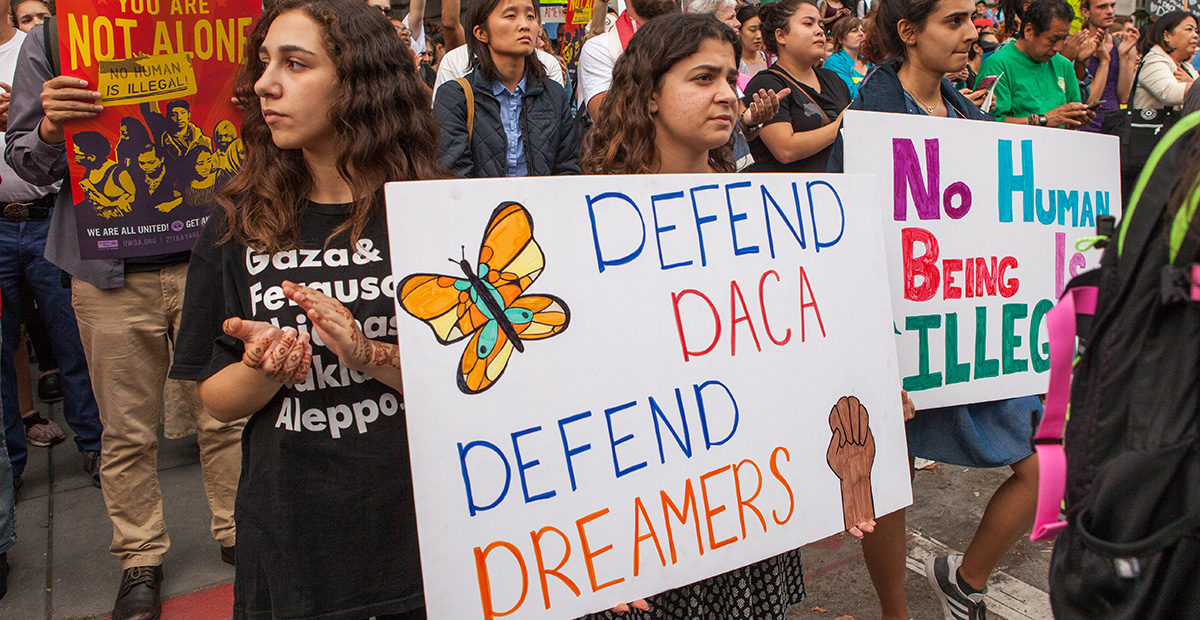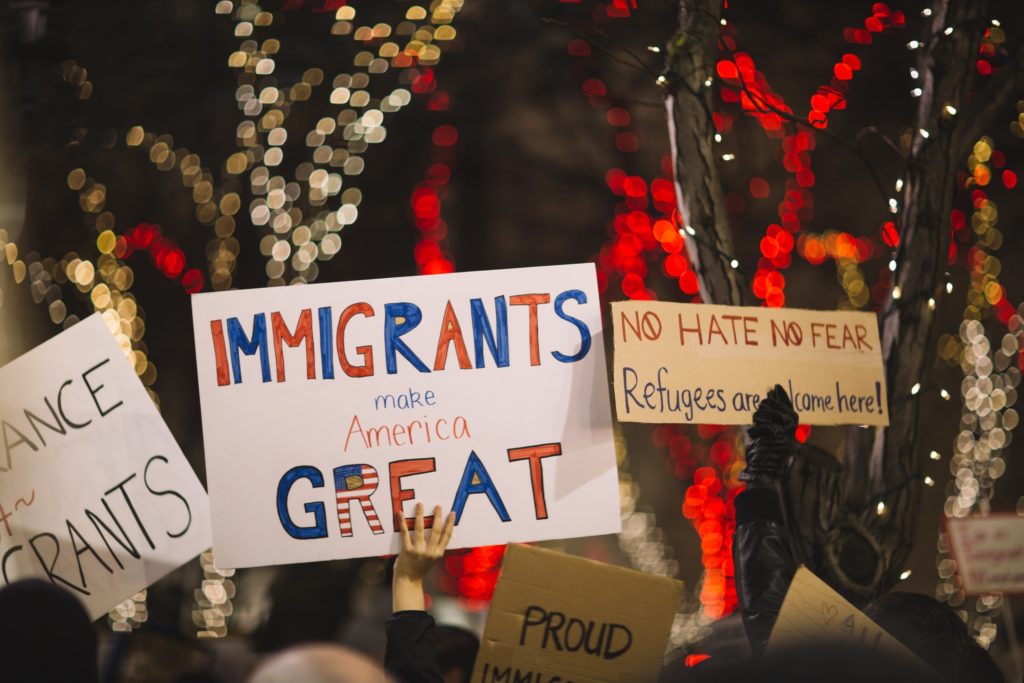FOR IMMEDIATE RELEASE
October 2, 2019
CONTACT
Juan Gastelum, National Immigration Law Center, [email protected]
Yatziri Tovar, Make the Road New York, [email protected]
Josh Dorner, Home Is Here Campaign, [email protected]
DACA Recipients, Broad Coalition of Immigrants’ Rights Organizations Launch “Home Is Here” Campaign Ahead of Crucial Supreme Court Hearing
Campaign to spotlight what’s at stake for 700,000 DACA recipients, their families, our communities, the economy, and our country if the Supreme Court allows unlawful termination of DACA to proceed
WASHINGTON, DC — Ahead of the November 12, 2019, U.S. Supreme Court oral arguments in three consolidated cases regarding President Trump’s unlawful termination of the Deferred Action for Childhood Arrivals (DACA) program, DACA recipients and a broad coalition of immigrants’ rights organizations today launched the Home Is Here campaign to highlight what is at stake for 700,000 DACA recipients, their families (including 256,000 U.S. citizen children), our communities, the economy, and our country if the Court overturns the lower court rulings currently allowing DACA renewals to continue.
“For the past seven years, DACA has been an incredibly successful program, providing temporary protection from deportation and peace of mind to nearly 800,000 young people who have lived in the U.S. for most of their lives. These Dreamers are part of the fabric of our country, but their futures are once again hanging by a thread as DACA heads to the Supreme Court,” said Karen Tumlin, founder and director of the Justice Action Center, manager of the Home Is Here Campaign, and part of the counsel team for McAleenan v. Batalla Vidal. “Ending DACA was both immoral and unlawful, as multiple courts across the country have found. We will continue to fight for DACA recipients and their families whose home is here, in the United States.”
Organizations participating in the campaign include CASA, the Center for American Progress, Community Change/FIRM, Coalition for Humane Immigrant Rights (CHIRLA), FWD.us, Justice Action Center, Make the Road New York, NAKASEC, National Immigration Law Center (NILC), and United We Dream (UWD).
The Home Is Here campaign tells the stories of and commits to protect DACA recipients who arrived in the United States as children and their families. Over the past seven years, more than 700,000 immigrant youth have been able to work, attend school, better support their families, and make even greater contributions to our communities and our country because of the temporary protection from deportation granted by the DACA program. If DACA ends, DACA recipients would be added to the list of those targeted in the deportation dragnet and threatened with deportation to a country that they may not remember and where they may not even speak the language, sparking a new wave of family separation crises nationwide. Their homes are here in the United States.
The campaign will underscore why DACA is legal, constitutional, and highly successful through events across the country over the next six weeks, including DACA renewal clinics and other efforts to encourage DACA recipients to renew their protections as soon as possible, digital storytelling, paid advertising, organizing, and rallies at the Supreme Court and in multiple cities across the country on November 12.
On November 12, the Supreme Court will hear arguments in McAleenan v. Batalla Vidal, Department of Homeland Security v. Regents of the University of California, and Trump v. NAACP. The lower courts in each of these cases ruled that the Trump administration’s September 2017 termination of the DACA program is unlawful. Nationwide injunctions and other court orders in place have allowed DACA renewals to continue since early 2018; however, no new first-time applications have been considered or granted since the attempted termination. A decision from the Supreme Court is expected between January and June 2020.
The deputy solicitor general of California, Michael Mongan, and noted Supreme Court advocate Ted Olson, solicitor general of the United States under the George W. Bush Administration, will argue on behalf of a number of individual DACA recipients and the other plaintiffs in these cases, including the regents of the University of California, Microsoft, Princeton University, and the National Association for the Advancement of Colored People (NAACP).
Current DACA recipients are encouraged to consult with an attorney as soon as possible to consider their renewal options. More information is available at www.RenewMyDACA.com. Americans can also contribute to a DACA recipient in need of the $495 renewal fee by visiting www.GoFundMe.com/DACA.
KEY DACA FACTS
– DACA recipients, on average, arrived in the United States at the age of 7 and have lived here for 20 years. More than a third arrived before age 5. They are our classmates, our coworkers, and our friends. Most know no other country as home.
– DACA recipients are parents to nearly 256,000 U.S. citizen children, and nearly every DACA recipient is part of a mixed–immigration status family. Ending DACA would rip apart hundreds of thousands of families.
– DACA recipients contribute significant federal, state, and local tax revenues that help provide important benefits to millions of Americans:
QUOTES FROM PARTICIPATING ORGANIZATIONS
Marielena Hincapié, Executive Director of the National Immigration Law Center: “For hundreds of thousands of immigrant youth whose home is here, DACA opened the door to opportunities and the stability many of us take for granted. For seven years, DACA has been transformative in the lives of DACA recipients who have grown up here, for our communities, and for our country as a whole. Allowing Trump’s unlawful and cruel attempt to end DACA to move forward would vastly compound the already devastating consequences of Trump’s relentless actions to criminalize, disenfranchise, and shut our doors to immigrants, refugees, Muslims, and other communities of color. In this critical moment, we’re reinvigorated and determined to keep fighting for DACA alongside immigrant youth and our partners across the country. We call on you to join us in this fight.”
Martin Batalla-Vidal, lead plaintiff in the Batalla Vidal v. McAleenan lawsuit to be heard by the U.S. Supreme Court and member of Make the Road New York: “Because of DACA, for the past seven years I have been able to go to school, work at my dream job, and remain with my family in the United States. The Trump administration’s cruel and unlawful termination of DACA has caused chaos and uncertainty in young immigrants across the country. DACA has been a valuable policy that has allowed hundreds of thousands to work, to go to school, and pursue their dreams. Next month, we hope the court will listen to voices of the hundreds of thousands of immigrants like me, whose lives are at stake. The court should uphold the rule of law by rejecting the Trump administration’s reckless attack on DACA and leave this vital policy in place.”
Gustavo Torres, CASA Executive Director: “CASA is proud to be a part of the #HomeIsHere campaign. We cannot allow the termination of DACA for over 700,000 young people who have been living and working in the United States for decades. Several federal courts have already ruled that Trump’s September 2017 attempt to end the DACA program was completely unlawful. On November 12th, we will go to the Supreme Court and continue to fight against this injustice. Our families are emboldened by knowing they are on the right side of history. We cannot let them down.”
Tom Jawetz, Vice President of Immigration Policy at the Center for American Progress: “We are united with our partners in the fight to defend DACA, and with it, the future of hundreds of thousands of young people who are woven into the fabric of our communities. Over the past six years, CAP’s research has demonstrated that DACA works, helping to strengthen national, state, and local economies and unlock tremendous human potential. Like every lower court that has ruled on the question so far, the U.S. Supreme Court should halt the Trump administration’s illegal efforts to end DACA so that we can work together to build a fair, humane, and workable immigration system that advances the nation’s interests and values.”
Angelica Salas, Executive Director of CHIRLA: “There have been key moments in our nation’s history when our hearts and minds join as one to form a strong union. One of those moments was the start of DACA, which welcomed so many Americans-in-waiting into this society. But, some key moments can mean danger especially if fear and hatred reign. This is one of those moments and it calls for us to defend the progress we have made. This is why together, as a movement and a society, we are rising up for DACA.”
Lorella Praeli, Vice President of Community Change: “DACA created a way for undocumented youth to fearlessly live their lives. We have to come together to build a country where all of us are free to thrive and where everyone has full citizenship. That’s what Home Is Here is about: fighting together to expand the circle, not close it.”
Maria Praeli, Government Relations Manager at FWD.us: “The Supreme Court’s decision will have life-altering consequences for DACA recipients like me, our families, and our communities. Millions of people across the country will be impacted by the decision. Dreamers have shown immeasurable bravery as we fight for the right to continue contributing to the only country that most of us have ever known. FWD.us is proud to continue to stand shoulder to shoulder with Dreamers, and the millions of our friends, family members, colleagues, and neighbors across the country who have made their voices heard in support of Dreamers.”
Becky Belcore, Co-Director of NAKASEC: “Many people are unaware that thousands of Asian Americans are DACA recipients and that this is a core issue within our community. We know that the vast majority of Americans support our young people. It is critical in this moment that all Americans show their support for the DACA program and call on the Supreme Court to rule on the right side of history!”
Cristina Jiménez, Executive Director & Co-Founder of United We Dream: “For the over 700,000 DACA recipients and our families: our home is here. We will be loud and unapologetic about our hopes, dreams, and fight for justice, and we won’t be scared by Trump’s personal mission to detain and deport as many people as possible. Immigrant youth are not bargaining chips and the Supreme Court should not be a tool for his mass deportation agenda either. Our communities are organizing nationwide to defend DACA and create a country where everyone has the freedom to thrive. The Supreme Court should uphold the three courts’ rulings that have kept DACA in place and not greenlight putting immigrant youth in the crosshairs for family separation.”
DACA RESOURCES
For more information, visit the Home Is Here website, HomeIsHere.us.
# # #











